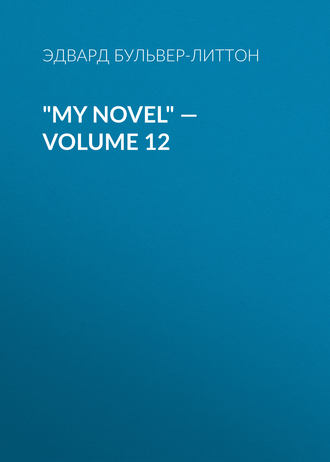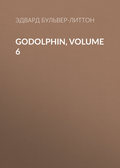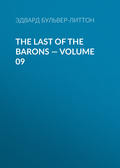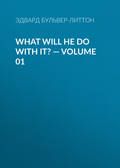
Эдвард Бульвер-Литтон
"My Novel" — Volume 12
"My informant stands yonder,—Mr. Randal Leslie; and I call upon Baron Levy to confirm my statement."
"It is true," said the baron, slowly, and as if overmastered by the tone and mien of an imperious chieftain.
There came a low sound like a hiss from Randal's livid lips.
"And was Mr. Leslie acquainted with your project for securing the person and hand of your young kinswoman?"
"Certainly,—and Baron Levy knows it." The baron bowed assent. "Permit me to add—for it is due to a lady nearly related to myself—that it was, as I have since learned, certain erroneous representations made to her by Mr. Leslie which alone induced that lady, after my own arguments had failed, to lend her aid to a project which otherwise she would have condemned as strongly as, Duke di Serrano, I now with unfeigned sincerity do myself condemn it."
There was about the count, as he thus spoke, so much of that personal dignity which, whether natural or artificial, imposes for the moment upon human judgment,—a dignity so supported by the singular advantages of his superb stature, his handsome countenance, his patrician air,—that the duke, moved by his good heart, extended his hand to the perfidious kinsman, and forgot all the Machiavellian wisdom which should have told him how little a man of the count's hardened profligacy was likely to be influenced by any purer motives, whether to frank confession or to manly repentance. The count took the hand thus extended to him, and bowed his face, perhaps to conceal the smile which would have betrayed his secret soul. Randal still remained mute, and pale as death. His tongue clove to his mouth. He felt that all present were shrinking from his side. At last, with a violent effort, he faltered out, in broken sentences,
"A charge so sudden may well—may well confound me. But—but—who can credit it? Both the law and commonsense pre-suppose some motive for a criminal action; what could be my motive here? I—myself the suitor for the hand of the duke's daughter—I betray her! Absurd—absurd! Duke, Duke, I put it to your own knowledge of mankind whoever goes thus against his own interest—and—and his own heart?"
This appeal, however feebly made, was not without effect on the philosopher. "That is true," said the duke, dropping his kinsman's hand; "I see no motive."
"Perhaps," said Harley, "Baron Levy may here enlighten us. Do you know of any motive of self-interest that could have actuated Mr. Leslie in assisting the count's schemes?"
Levy hesitated. The count took up the word. "Pardieu!" said he, in his clear tone of determination and will—"pardieu! I can have no doubt thrown on my assertion, least of all by those who know of its truth; and I call upon you, Baron Levy, to state whether, in case of my marriage with the duke's daughter, I had not agreed to present my sister with a sum, to which she alleged some ancient claim, and which would have passed through your hands?"
"Certainly, that is true," said the baron.
"And would Mr. Leslie have benefited by any portion of that sum?"
Levy paused again.
"Speak, sir," said the count, frowning.
"The fact is," said the baron, "that Mr. Leslie was anxious to complete a purchase of certain estates that had once belonged to his family, and that the count's marriage with the signora, and his sister's marriage with Mr. Hazeldean, would have enabled me to accommodate Mr. Leslie with a loan to effect that purchase."
"What! what!" exclaimed the squire, hastily buttoning his breast-pocket with one hand, while he seized Randal's arm with the other—"my son's marriage! You lent yourself to that, too? Don't look so like a lashed hound! Speak out like a man, if man you be!"
"Lent himself to that, my good sir!" said the count. "Do you suppose that the Marchesa di Negra could have condescended to an alliance with a Mr. Hazeldean—"
"Condescended! a Hazeldean of Hazeldean!" exclaimed the squire, turning fiercely, and half choked with indignation. "Unless," continued the count, imperturbably, "she had been compelled by circumstances to do that said Mr. Hazeldean the honour to accept a pecuniary accommodation, which she had no other mode to discharge? And here, sir, the family of Hazeldean, I am bound to say, owe a great debt of gratitude to Mr. Leslie; for it was he who most forcibly represented to her the necessity for this misalliance; and it was he, I believe, who suggested to my friend the baron the mode by which Mr. Hazeldean was best enabled to afford the accommodation my sister deigned to accept."
"Mode! the post-obit!" ejaculated the squire, relinquishing his hold of Randal to lay his gripe upon Levy.
The baron shrugged his shoulders. "Any friend of Mr. Frank Hazeldean's would have recommended the same, as the most economical mode of raising money."
Parson Dale, who had at first been more shocked than any one present at these gradual revelations of Randal's treachery, now turning his eyes towards the young man, was so seized with commiseration at the sight of Randal's face, that he laid his hand on Harley's arm, and whispered him, "Look, look at that countenance!—-and one so young! Spare him, spare him!"
"Mr. Leslie," said Harley, in softened tones, "believe me that nothing short of justice to the Duke di Serrano—justice even to my young friend Mr. Hazeldean—has compelled me to this painful duty. Here let all inquiry terminate."
"And," said the count, with exquisite blandness, "since I have been informed by my Lord L'Estrange that Mr. Leslie has represented as a serious act on his part that personal challenge to myself, which I understood was but a pleasant and amicable arrangement in our baffled scheme, let me assure Mr. Leslie that if he be not satisfied with the regret that I now express for the leading share I have taken in these disclosures, I am wholly at Mr. Leslie's service."
"Peace, homicide," cried the parson, shuddering; and he glided to the side of the detected sinner, from whom all else had recoiled in loathing.
Craft against craft, talent against talent, treason against treason—in all this Randal Leslie would have risen superior to Giulio di Peschiera. But what now crushed him was not the superior intellect,—it was the sheer brute power of audacity and nerve. Here stood the careless, unblushing villain, making light of his guilt, carrying it away from disgust itself, with resolute look and front erect. There stood the abler, subtler, profounder criminal, cowering, abject, pitiful; the power of mere intellectual knowledge shivered into pieces against the brazen metal with which the accident of constitution often arms some ignobler nature.
The contrast was striking, and implied that truth so universally felt, yet so little acknowledged in actual life, that men with audacity and force of character can subdue and paralyze those far superior to themselves in ability and intelligence. It was these qualities which made Peschiera Randal's master; nay, the very physical attributes of the count, his very voice and form, his bold front and unshrinking eye, overpowered the acuter mind of the refining schemer, as in a popular assembly some burly Cleon cows into timorous silence every dissentient sage. But Randal turned in sullen impatience from the parson's whisper, that breathed comfort or urged repentance; and at length said, with clearer tones than he had yet mustered,
"It is not a personal conflict with the Count di Peschiera that can vindicate my honour; and I disdain to defend myself against the accusations of a usurer, and of a mam who—"
"Monsieur!" said the count, drawing himself up.
"A man who," persisted Randal, though he trembled visibly, "by his own confession, was himself guilty of all the schemes in which he would represent me as his accomplice, and who now, not clearing himself, would yet convict another—"
"/Cher petit monsieur!/" said the count, with his grand air of disdain, "when men like me make use of men like you, we reward them for a service if rendered, or discard them if the service be not done; and if I condescend to confess and apologize for any act I have committed, surely Mr. Randal Leslie might do the same without disparagement to his dignity. But I should never, sir, have taken the trouble to appear against you, had you not, as I learn, pretended to the hand of the lady whom I had hoped, with less presumption, to call my bride; and in this, how can I tell that you have not tricked and betrayed me? Is there anything in our past acquaintance that warrants me to believe that, instead of serving me, you sought but to serve yourself? Be that as it may, I had but one mode of repairing to the head of my house the wrongs I have done him, and that was by saving his daughter from a derogatory alliance with an impostor who had abetted my schemes for hire, and who now would filch for himself their fruit."
"Duke!" exclaimed Randal.
The duke turned his back. Randal extended his hands to the squire. "Mr. Hazeldean—what? you, too, condemn me, and unheard?"
"Unheard!—zounds, no! If you have anything to say, speak truth, and shame the devil."
"I abet Frank's marriage! I sanction the post-obit! Oh!" cried Randal, clinging to a straw, "if Frank himself were but here!"
Harley's compassion vanished before this sustained hypocrisy.
"You wish for the presence of Frank Hazeldean? It is just." Harley opened the door of the inner room, and Frank appeared at the entrance.
"My son! my son!" cried the squire, rushing forward, and clasping Frank to his broad, fatherly breast.
This affecting incident gave a sudden change to the feelings of the audience, and for a moment Randal himself was forgotten. The young man seized that moment. Reprieved, as it were, from the glare of contemptuous, accusing eyes, slowly he crept to the door, slowly and noiselessly, as the viper, when it is wounded, drops its crest and glides writhing through the grass. Levy followed him to the threshold, and whispered in his ear,
"I could not help it,—you would have done the same by me. You see you have failed in everything; and when a man fails completely, we both agreed that we must give him up altogether."
Randal said not a word, and the baron marked his shadow fall on the broad stairs, stealing down, down, step after step, till it faded from the stones.
"But he was of some use," muttered Levy. "His treachery and his exposure will gall the childless Egerton. Some little revenge still!"
The count touched the arm of the musing usurer,
"J'ai bien joue mon role, n'est ce pas?"—(I have well played my part, have I not?)
"Your part! Ah, but, my dear count, I do not quite understand it."
"Ma foi, you are passably dull. I had just been landed in France, when a letter from L'Estrange reached me. It was couched as an invitation, which I interpreted to—the duello. Such invitations I never refuse. I replied: I came hither, took my lodgings at an inn. My Lord seeks me last night.
"I begin in the tone you may suppose. Pardieu! he is clever, milord! He shows me a letter from the Prince Von ——— , Alphonse's recall, my own banishment. He places before me, but with admirable suavity, the option of beggary and ruin, or an honourable claim on Alphonso's gratitude. And as for that /petit monsieur/, do you think I could quietly contemplate my own tool's enjoyment of all I had lost myself? Nay, more, if that young Harpagon were Alphonso's son-inlaw, could the duke have a whisperer at his ear more fatal to my own interests? To be brief, I saw at a glance my best course. I have adopted it. The difficulty was to extricate myself as became a man /de sang et de jeu/. If I have done so, congratulate me. Alphonso has taken my hand, and I now leave it to him to attend to my fortunes, and clear up my repute."
"If you are going to London," said Levy, "my carriage, ere this, must be at the door, and I shall be proud to offer you a seat, and converse with you on your prospects. But, /peste, mon cher/, your fall has been from a great height, and any other man would have broken his bones."
"Strength is ever light," said the count, smiling; "and it does not fall; it leaps down and rebounds."
Levy looked at the count, and blamed himself for having disparaged Peschiera and overrated Randal.
While this conference went on, Harley was by Violante's side.
"I have kept my promise to you," said he, with a kind of tender humility. "Are you still so severe on me?"
"Ah," answered Violante, gazing on his noble brow, with all a woman's pride in her eloquent, admiring eyes, "I have heard from Mr. Dale that you have achieved a conquest over yourself, which makes me ashamed to think that I presumed to doubt how your heart would speak when a moment of wrath (though of wrath so just) had passed away."
"No, Violante, do not acquit me yet; witness my revenge (for I have not foregone it), and then let my heart speak, and breathe its prayer that the angel voice, which it now beats to hear, may still be its guardian monitor."
"What is this?" cried an amazed voice; and Harley, turning round, saw that the duke was by his side; and, glancing with ludicrous surprise, now to Harley, now to Violante, "Am I to understand that you—"
"Have freed you from one suitor for this dear hand, to become myself your petitioner!"
"/Corpo di Bacco!/" cried the sage, almost embracing Harley, "this, indeed, is joyful news. But I must not again make a rash pledge,—not again force my child's inclinations. And Violante; you see, is running away."
The duke stretched out his arm, and detained his child. He drew her to his breast, and whispered in her ear. Violante blushed crimson, and rested her head on his shoulder. Harley eagerly pressed forward.
"There," said the duke, joining Harley's hand with his daughter's, "I don't think I shall hear much more of the convent; but anything of this sort I never suspected. If there be a language in the world for which there is no lexicon nor grammar, it is that which a woman thinks in, but never speaks."
"It is all that is left of the language spoken in paradise," said Harley.
"In the dialogue between Eve and the serpent,—yes," quoth the incorrigible sage. "But who comes here?—our friend Leonard."
Leonard now entered the room; but Harley could scarcely greet him, before he was interrupted by the count. "Milord," said Peschiera, beckoning him aside, "I have fulfilled my promise, and I will now leave your roof. Baron Levy returns to London, and offers me a seat in his carriage, which is already, I believe, at your door. The duke and his daughter will readily forgive me if I do not ceremoniously bid them farewell. In our altered positions, it does not become me too intrusively to claim kindred; it became me only to remove, as I trust I have done, a barrier against the claim. If you approve my conduct, you will state your own opinion to the duke." With a profound salutation the count turned to depart; nor did Harley attempt to stay him, but attended him down the stairs with polite formality.
"Remember only, my Lord, that I solicit nothing. I may allow myself to accept,—/voilia tout/." He bowed again, with the inimitable grace of the old regime, and stepped into the baron's travelling carriage.
Levy, who had lingered behind, paused to accost L'Estrange. "Your Lordship will explain to Mr. Egerton how his adopted son deserved his esteem, and repaid his kindness. For the rest, though you have bought up the more pressing and immediate demands on Mr. Egerton, I fear that even your fortune will not enable you to clear those liabilities which will leave him, perhaps, a pauper!"
"Baron Levy," said Harley, abruptly, "if I have forgiven Mr. Egerton, cannot you too forgive? Me he has wronged; you have wronged him, and more foully."
"No, my Lord, I cannot forgive him. You he has never humiliated, you he has never employed for his wants, and scorned as his companion. You have never known what it is to start in life with one whose fortunes were equal to your own, whose talents were not superior. Look you, Lord L'Estrange, in spite of this difference between me and Egerton, that he has squandered the wealth that he gained without effort, while I have converted the follies of others into my own ample revenues, the spendthrift in his penury has the respect and position which millions cannot bestow upon me. You would say that I am an usurer, and he is a statesman. But do you know what I should have been, had I not been born the natural son of a peer? Can you guess what I should have been if Nora Avenel had been my wife? The blot on my birth, and the blight on my youth, and the knowledge that he who was rising every year into the rank which entitled him to reject me as a guest at his table—he whom the world called the model of a gentleman—was a coward and a liar to the friend of his youth,—all this made me look on the world with contempt; and, despising Audley Egerton, I yet hated him and envied. You, whom he wronged, stretch your hand as before to the great statesman; from my touch you would shrink as pollution. My Lord, you may forgive him whom you love and pity; I cannot forgive him whom I scorn and envy. Pardon my prolixity. I now quit your house." The baron moved a step, then, turning back, said with a withering sneer,—
"But you will tell Mr. Egerton how I helped to expose the son he adopted! I thought of the childless man when your Lordship imagined I was but in fear of your threats. Ha! ha! that will sting."
The baron gnashed his teeth as, hastily entering the carriage, he drew down the blinds. The post-boys cracked their whips, and the wheels rolled away.
"Who can judge," thought Harley, "through what modes retribution comes home to the breast? That man is chastised in his wealth, ever gnawed by desire for what his wealth cannot buy!" He roused himself, cleared his brow, as from a thought that darkened and troubled; and, entering the saloon, laid his hand upon Leonard's shoulder, and looked, rejoicing, into the poet's mild, honest, lustrous eyes. "Leonard," said he, gently, "your hour is come at last."
CHAPTER XXXIV
Audely Egerton was alone in his apartment. A heavy sleep had come over him, shortly after Harley and Randal had left the house in the early morning; and that sleep continued till late in the day. All the while the town of Lansmere had been distracted in his cause, all the while so many tumultuous passions had run riot in the contest that was to close or re-open for the statesman's ambition the Janus gates of political war, the object of so many fears and hopes, schemes and counter-schemes, had slumbered quietly as an infant in the cradle. He woke but in time to receive Harley's despatch, announcing the success of his election; and adding, "Before the night you shall embrace your son. Do not join us below when I return. Keep calm,—we will come to you."
In fact, though not aware of the dread nature of Audley's complaint, with its warning symptoms, Lord L'Estrange wished to spare to his friend the scene of Randal's exposure.
On the receipt of that letter Egerton rose. At the prospect of seeing his son—Nora's son—the very memory of his disease vanished. The poor, weary, over-laboured heart indeed beat loud, and with many a jerk and spasm. He heeded it not. The victory, that restored him to the sole life for which he had hitherto cared to live, was clean forgotten. Nature claimed her own,—claimed it in scorn of death, and in oblivion of renown.
There sat the man, dressed with his habitual precision,—the black coat, buttoned across the broad breast; his countenance, so mechanically habituated to self-control, still revealing little of emotion, though the sickly flush came and went on the bronzed cheek, and the eye watched the hand of the clock, and the ear hungered for a foot-tread along the corridor. At length the sound was heard,—steps, many steps. He sprung to his feet, he stood on the hearth. Was the hearth to be solitary no more? Harley entered first. Egerton's eyes rested on him eagerly for a moment, and strained onward across the threshold. Leonard came next,— Leonard Fairfield, whom he had seen as his opponent! He began to suspect, to conjecture, to see the mother's tender eyes in the son's manly face. Involuntarily he opened his arms; but, Leonard remaining still, let them fall with a deep sigh, and fancied himself deceived.
"Friend," said Harley, "I give to you a son proved in adversity, and who has fought his own way to fame. Leonard, in the man to whom I prayed you to sacrifice your own ambition, of whom you have spoken with such worthy praise, whose career of honour you have promoted, and whose life, unsatisfied by those honours, you will soothe with your filial love, behold the husband of Nora Avenel! Kneel to your father! O Audley, embrace your son!"
"Here, here!" exclaimed Egerton, as Leonard bent his knee,—"here to my heart! Look at me with those eyes!—kindly, forgivingly: they are your mother's!" His proud head sunk on his son's shoulder.
"But this is not enough," said Harley, leading Helen, and placing her by Leonard's side. "You must open your heart for more. Take into its folds my sweet ward and daughter. What is a home without the smile of woman? They have loved each other from children. Audley, yours be the hand to join,—yours be the lips to bless."
Leonard started anxiously. "Oh, sir!—oh, my father!—this generous sacrifice may not be; for he—he who has saved me for this surpassing joy—he too loves her!"
"Nay, Leonard," said Harley, smiling, "I am not so neglectful of myself. Another home woos you, Audley. He whom you long so vainly sought to reconcile to life, exchanging mournful dreams for happy duties,—he, too, presents you to his bride. Love her for my sake,—for your own. She it is, not I, who presides over this hallowed reunion. But for her, I should have been a blinded, vindictive, guilty, repentant man; and—" Violante's soft hand was on his lips. "Thus," said the parson, with mild solemnity, "man finds that the Saviour's precepts, 'Let not the sun go down upon thy wrath,' and 'Love one another,' are clews that conduct us through the labyrinth of human life, when the schemes of fraud and hate snap asunder, and leave us lost amidst the maze."
Egerton reared his head, as if to answer; and all present were struck and appalled by the sudden change that had come over his countenance. There was a film upon the eye, a shadow on the aspect; the words failed his lips; he sunk on the seat beside him. The left hand rested droopingly upon the piles of public papers and official documents, and the fingers played with them, as the bedridden dying sufferer plays with the coverlid he will soon exchange for the winding-sheet. But his right hand seemed to feel, as through the dark, for the recovered son; and having touched what it sought, feebly drew Leonard near and nearer. Alas! that blissful PRIVATE LIFE—that close centre round the core of being in the individual man—so long missed and pined for, slipped from him, as it were, the moment it reappeared; hurried away, as the circle on the ocean, which is scarce seen ere it vanishes amidst infinity. Suddenly both hands were still; the head fell back. Joy had burst asunder the last ligaments, so fretted away in unrevealing sorrow. Afar, their sound borne into that room, the joy-bells were pealing triumph; mobs roaring out huzzas; the weak cry of John Avenel might be blent in those shouts, as the drunken zealots reeled by his cottage door, and startled the screaming ravens that wheeled round the hollow oak. The boom which is sent from the waves on the surface of life, while the deeps are so noiseless in their march, was wafted on the wintry air into the chamber of the statesman it honoured, and over the grass sighing low upon Nora's grave. But there was one in the chamber, as in the grave, for whom the boom on the wave had no sound, and the march of the deep had no tide. Amidst promises of home, and union, and peace, and fame, Death strode into the household ring, and, seating itself, calm and still, looked life-like,—warm hearts throbbing round it; lofty hopes fluttering upward; Love kneeling at its feet; Religion, with lifted finger, standing by its side.







